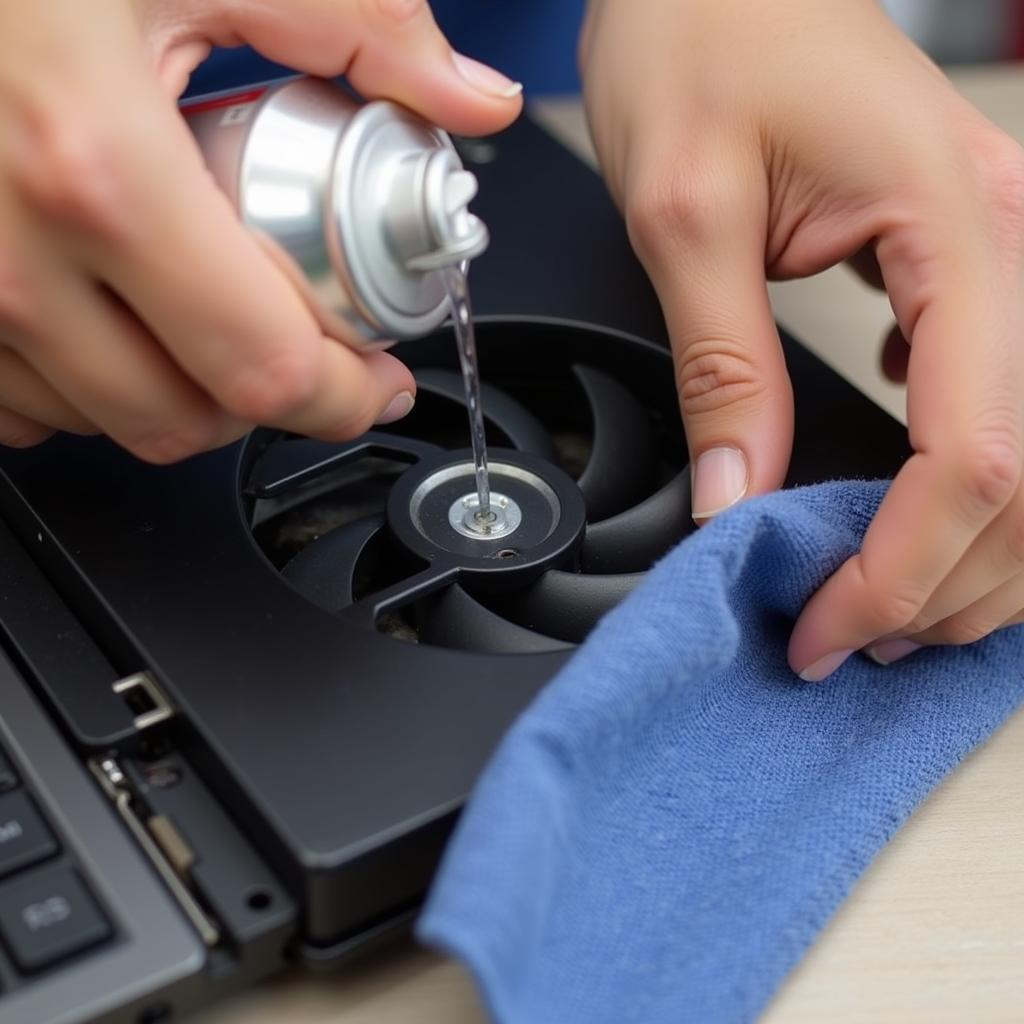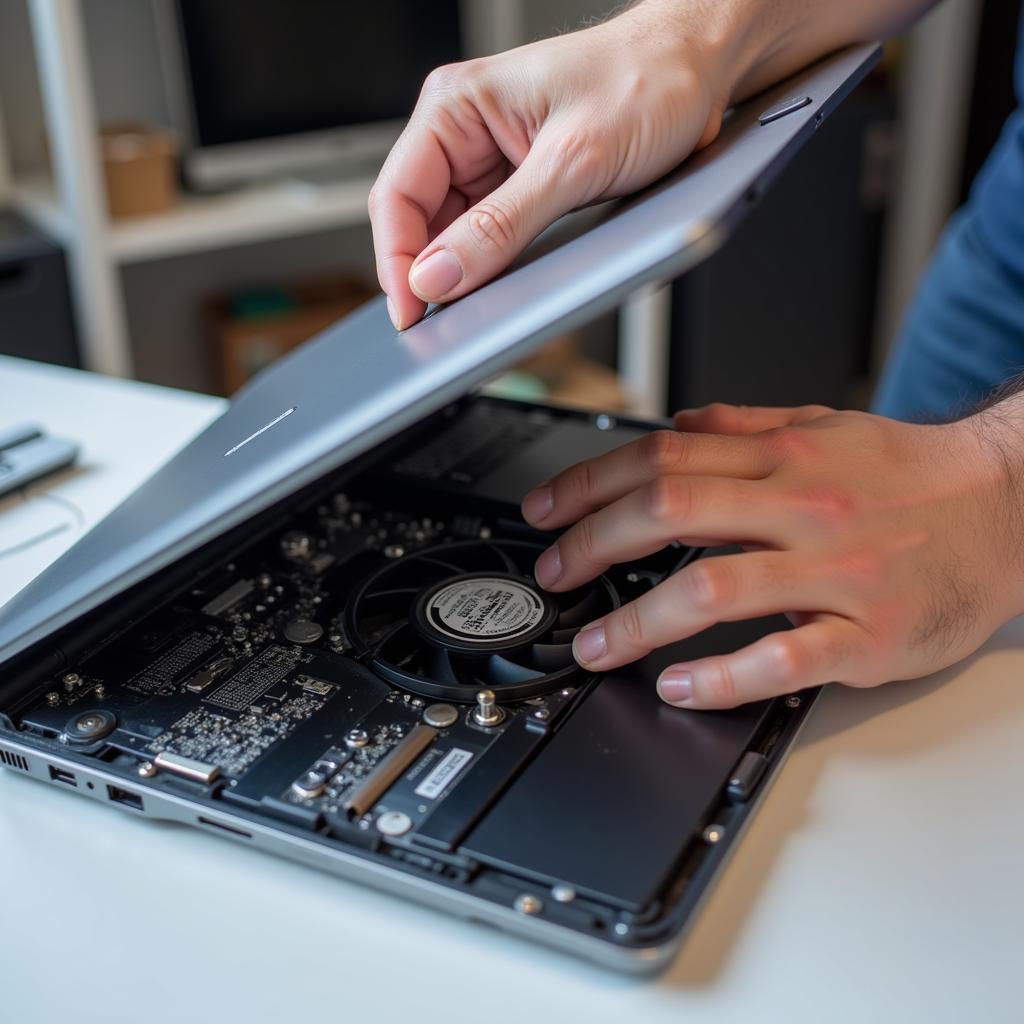A properly functioning laptop fan is crucial for maintaining optimal performance and preventing overheating. Just like a car engine needs a cooling system, your laptop relies on its fan to dissipate heat generated by the processor, graphics card, and other components. Neglecting your laptop’s cooling system can lead to performance throttling, system instability, and even permanent hardware damage.
Why Laptop Fan Checks Are Essential
Regular laptop fan checks are essential for several reasons:
- Prevent Overheating: A malfunctioning fan can’t effectively cool down your laptop, leading to overheating and potential damage to vital components.
- Maintain Performance: Overheating forces your laptop to slow down (thermal throttling) to reduce heat generation, impacting performance and productivity.
- Extend Lifespan: Proper cooling helps prolong the lifespan of your laptop’s components by preventing heat-related wear and tear.
- Avoid Costly Repairs: Addressing fan issues early can prevent more serious problems down the line that may require expensive repairs or even replacement.
How to Know if Your Laptop Fan is Failing
Several signs indicate a potential problem with your laptop fan:
- Excessive Noise: Unusual whirring, grinding, or clicking sounds from your laptop could signify a failing fan.
- Overheating: If your laptop feels hot to the touch, especially on the bottom, it’s a clear sign that the cooling system is struggling.
- Performance Issues: Sudden slowdowns, freezes, or unexpected shutdowns, particularly during demanding tasks, can point to overheating and fan issues.
- Error Messages: Some laptops display error messages related to fan failure or overheating.
Simple Laptop Fan Checks You Can Do
 Inspecting Laptop Fan
Inspecting Laptop Fan
Before rushing to a technician, you can perform these simple checks yourself:
-
Visual Inspection: Power off your laptop and unplug it. Look for dust buildup on the fan blades and vents. Use a can of compressed air to carefully blow away dust and debris.
-
Listen Carefully: Power on your laptop and listen to the fan. Does it sound louder or different than usual? Unusual noises can indicate a problem.
-
Feel for Heat: While the laptop is running, gently feel the bottom and areas near the fan vents. Excessive heat is a warning sign.
-
Monitor Performance: Pay attention to your laptop’s performance. Does it slow down or shut down unexpectedly, especially when running demanding applications?
-
System Tools: Utilize built-in system monitoring tools or third-party applications to check fan speed, temperature readings, and other system parameters.
When to Seek Professional Help
If your laptop fan checks reveal any of the following, it’s best to seek professional help:
- Persistent Overheating
- Loud, Grinding Noises
- Fan Not Spinning at All
- Error Messages Related to Fan Failure
- Performance Issues Despite Cleaning and Checks
 Laptop Fan Repair by a Technician
Laptop Fan Repair by a Technician
Tips to Keep Your Laptop Fan in Top Shape
- Regular Cleaning: Schedule routine cleanings to remove dust buildup from the fan and vents.
- Proper Ventilation: Use your laptop on a hard, flat surface to ensure proper airflow. Avoid using it on soft surfaces like beds or pillows.
- Cooling Pads: Consider using a laptop cooling pad to provide additional airflow and help dissipate heat.
- Manage Resource-Intensive Tasks: Avoid running demanding applications for extended periods or close unnecessary programs to reduce the load on your system.
Conclusion
Regular laptop fan checks are essential for ensuring your laptop’s longevity, optimal performance, and preventing costly repairs. By incorporating simple checks and maintenance practices into your routine, you can keep your laptop running cool and efficiently for years to come.
FAQs
Q: How often should I clean my laptop fan?
A: It’s recommended to clean your laptop fan every 3-6 months, depending on usage and environment.
Q: Can I replace the laptop fan myself?
A: While possible, laptop disassembly can be complex. It’s generally recommended to seek professional help for fan replacement.
Q: Are laptop cooling pads effective?
A: Yes, cooling pads can help improve airflow and reduce laptop temperatures, especially during demanding tasks.
Q: What are some signs of a dying hard drive?
A: Unusual noises from the hard drive, frequent crashes, and slow file access can indicate a failing hard drive. This is related to overall laptop health, and while not directly a fan issue, it’s important to be aware of such signs.
For further assistance or inquiries, please don’t hesitate to contact our dedicated support team:
Phone: 0903426737
Email: fansbongda@gmail.com
Address: Tổ 9, Khu 6, Phường Giếng Đáy, Thành Phố Hạ Long, Giếng Đáy, Hạ Long, Quảng Ninh, Việt Nam.
We are available 24/7 to assist you with all your laptop needs.


